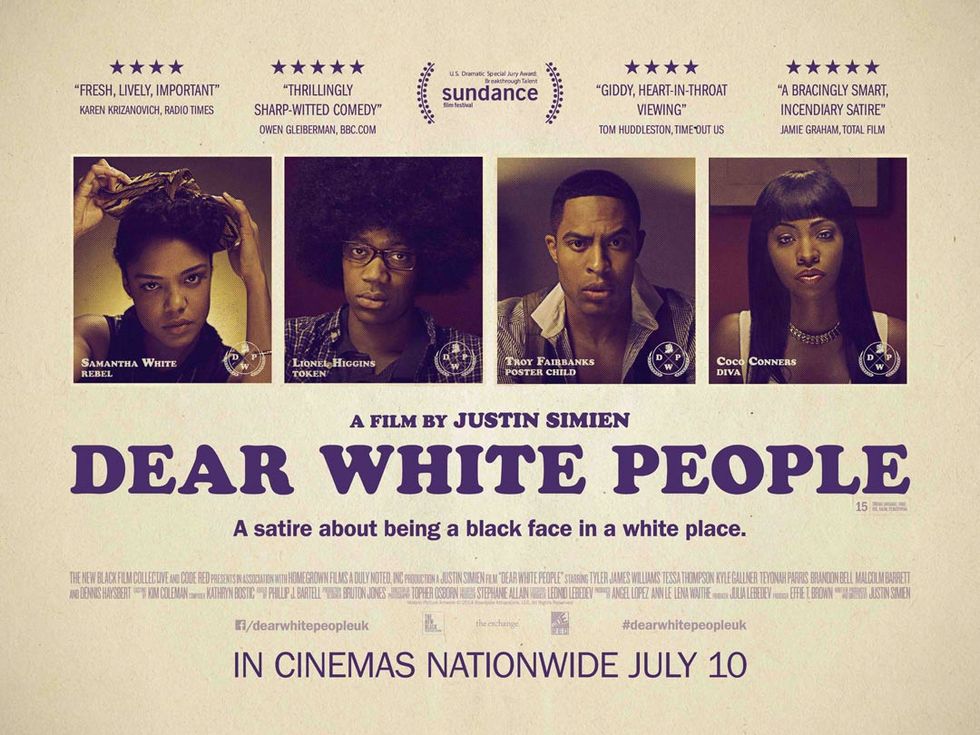Before I even attempt to express my views here, let me make it clear that I am a straight white male writing this, so if for any reason that disqualifies me from expressing this view, then at least I haven’t wasted your time. But for someone who was hoping and praying the the film iteration of Justin Simien’s racial commentary Dear White People was going to be helped out by the up and coming TV iteration, or the equivalent you would give to a Netflix original series, I was sadly mistaken.
While part of me wants to say that any discussion of race nowadays immediately sparks controversy, mainly for using the word race at all, I know better than to use such a lazy cop-out for a real argument, so I’m going to attempt to analyze both the movie and the show from a more literary perspective, and by that I mean mostly that I am going to look at a few key characters and see how, or if, they develop.
Let’s start with Sam, for instance. A black girl with a secret white boyfriend who is determined to end racism at Winchester University, an Ivy League school in America. For the type of show that Dear White People shoots to be, I think it stands as a real artistic testament. Yes, it does tie in all four perspectives and characters into the film, but unfortunately those characters aren’t particularly far reaching, and yes, Lionel is gay, so there’s an even greater attempt to make his character matter more than the others, and I feel like he stands out, but in the show and not the film.
In terms of portraying white people, it makes total sense to have every one of them be misinformed, dumb, and dispensable. That’s just how satire works, but one crucial component that Simiens, in my opinion, didn’t really focus on that well, is that in belittling every white character, and also in turn ostracizing most of the black characters, or having them as stand-alone characters, they have to be strong, and none of them are strong. For instance, Troy essentially answers to his father, both in the show and in the film. He has no personal say in how he acts, and so what does that do for the commentary if one of the central characters is essentially being oppressed by his own flesh and blood? If that was the whole point of Troy’s character, this all works perfectly, and so I have no further criticism of it, but if not, it begs every’s writer’s least favorite question: why should I care about this character?
The racist party is an entirely different issue. These kinds of racist outbursts happen all the time, regardless of the amount of discourses we seem to have. For instance, Wheaton College in Massachusetts had an instance in which swastikas were drawn on the front doors of a Minerva house populated by Jewish students, and this was within the last 5-10 years, too. And of course this hasn’t been the only case of racial insensitivity on a campus in that time frame, but it was one I was exposed to directly, and thus I use it in example.
I don’t pretend to be an expert on race relations, or anything even close to it. I more or less Identify as a Netflix addict first and a literary critic second, so I love to watch things I know other people have had differing opinions about and try to establish my own opinion of. I’m not even going to begin to talk about 13 Reasons Why: I liked the book, thought the show should have been closer to it but still like it, am willing to talk about it with anyone with the consus that I will probably have a very different opinion than they do.
A lot of the criticism that Dear White People has gotten is pathetically ignorant and lazy. One reviewer literally just wrote, “Do not lose your time. Do not lose your time. Do not lose your time.” Granted, to ask the reviewer’s race, in order to determine whether or not he is worth listening to, is inherently racist to me, I think it is clear that this is just a lazy, semi-ignorant white viewer. I say semi-ignorant not because I think he’s white but because I’d give any human the credit of watching something before telling people not to watch.
Race simply needs to be addressed in America, but while I think racism of course needs to be a thing of the past, I think Dear White People feels like more of an ‘anti-black-and-sometimes-other-groups’ witch hunt, while we as a society could benefit from a commentary on modern racism as a whole, in the same form that Dear White People is set in.









































